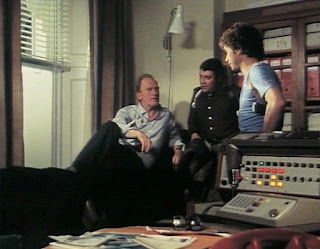I love murder stories with theatrical or movie studio backgrounds and the second season of Columbo provides two such tales which makes these two episodes a perfect double feature for me.
The fourth season two episode Dagger of the Mind could have been called Columbo Goes to London. Never have I seen so much gratuitous use of travelogue-type footage of the tourist spots of London. This is also a very under-appreciated episode - there are several very important elements that many people seem to overlook in this story.
Everyone’s favourite shabby detective is in London, as a guest of Scotland Yard, to address a police conference. He finds himself caught up in a theatrical murder.
Fading stars Nicholas Frame (Richard Basehart) and his wife Lillian Stanhope (Honor Blackman) are about to open in Macbeth in the West End when the wealthy aristocrat putting up the money for the play is killed. Since this is Columbo and the murderer is always revealed right at the start there’s no harm in revealing that our two has-been actors are involved. The murder has been arranged to look like an accident but Columbo just happens to be on the scene and he’s immediately suspicious.
What follows is the usual battle of wills as Columbo tries to persuade the killers to make a mistake so he can prove his case.
The first important thing to note is that Frame and his wife are appearing in Macbeth. Just like the protagonists in the play the protagonists of Dagger of the Mind find that ambition has its price and it’s a price that keeps on increasing. There is one plot point that has attracted criticism but once you remember the Macbeth connection it makes sense - once you decide that ambition overrides everything else you have jumped aboard a roller coaster that you can’t get off.
Another point sometimes overlooked relates to Richard Basehart’s performance. He is not supposed to be playing a great Shakespearian actor. He is playing an ageing ham who thinks he is a great Shakespearian actor and thinks he sees his opportunity to prove it, and to prove his critics wrong. In fact both Nicholas and Lillian are well past their prime and this production is their last chance to rekindle their fading careers. With this in mind it’s clear that Basehart knows exactly what he’s doing with his performance and he nails Nicholas Frame’s character superbly. Blackman is equally good and the two of them chew every piece of scenery they can get their teeth into.
Adding to the fun is the great Wilfred Hyde-White as the butler Tanner.
The fifth episode, Requiem for a Falling Star, can be seen as a kind of follow-up to Dagger of the Mind dealing as it does with murder in Hollywood. Another link between the two episodes is that both deal with stars whose careers are on the downslide.
Fading star Nora Chandler (Anne Baxter) is the murderess but she kills the wrong person. She meant to kill sleazy gossip columnist Jerry Parks (Mel Ferrer) who is blackmailing but by mistake she kills her faithful secretary and friend Jean Davis (Pippa Scott). Lieutenant Columbo happens to be one of Nora’s biggest fans and he hates to think she might be a murderess but the evidence seems to point that way.
This is a rather untypical Columbo episode. As usual it’s an inverted detective story but with several very interesting variations (I won’t spilt the episode by giving any hints as the nature of these variations).
Like all Columbo episodes it’s pretty scrupulously fair play. We see all the same clues that Columbo sees although of course we might not always interpret them correctly.
Anne Baxter gives a spirited performance as the formidable Nora.
Columbo never pretended to be a realistic cop show and always works best when Columbo is up against formidable adversaries played by actors who are willing to go over-the-top. These two episodes qualify on both counts. Dagger of the Mind is more fun thanks to the extraordinary overacting of Richard Basehart and Honor Blackman but Requiem for a Falling Star is more ambitious and demonstrates what could be achieved when the basic formula of the series was tweaked just a little. Both episodes are fine entertainment.












